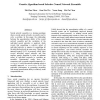Free Online Productivity Tools
i2Speak
i2Symbol
i2OCR
iTex2Img
iWeb2Print
iWeb2Shot
i2Type
iPdf2Split
iPdf2Merge
i2Bopomofo
i2Arabic
i2Style
i2Image
i2PDF
iLatex2Rtf
Sci2ools
131
click to vote
IJCAI
2001
2001
Genetic Algorithm based Selective Neural Network Ensemble
Neural network ensemble is a learning paradigm where several neural networks are jointly used to solve a problem. In this paper, the relationship between the generalization ability of the neural network ensemble and the correlation of the individual neural networks is analyzed, which reveals that ensembling a selective subset of individual networks is superior to ensembling all the individual networks in some cases. Therefore an approach named GASEN is proposed, which trains several individual neural networks and then employs genetic algorithm to select an optimum subset of individual networks to constitute an ensemble. Experimental results show that, comparing with a popular ensemble approach, i.e. averaging all, and a theoretically optimum selective ensemble approach, i.e. enumerating, GASEN has preferable performance in generating ensembles with strong generalization ability in relatively small computational cost.
Related Content
| Added | 31 Oct 2010 |
| Updated | 31 Oct 2010 |
| Type | Conference |
| Year | 2001 |
| Where | IJCAI |
| Authors | Zhi-Hua Zhou, Jianxin Wu, Yuan Jiang, Shifu Chen |
Comments (0)

